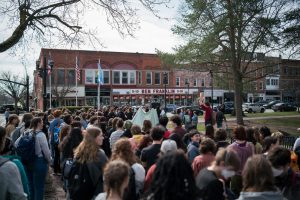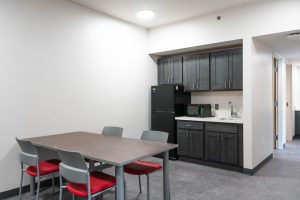Administration Begins Implementation of Several Working Group Proposals
September 20, 2013
The Oberlin administration is incrementally implementing many of the proposals put forward by student working groups in the wake of the bias incidents last spring. Although several of the proposals have been accepted, several remain to be seen.
In response to the student proposals, the administration agreed to construct a new fitness center in the southwest basement area of South Hall. Vice President and Dean of Students Eric Estes described the new gym as being in the “planning stages” and said that he hoped the facility would be ready for use by the end of the semester.
“There were a lot of conversa- tions last semester about mental health and wellness on campus. Exercise is a huge part of that, so [not having] any resources for [exercise] on South Campus — that’s a problem,” said College senior Toby Irving, a member of the Trainings and Workshops working group. “The fitness center was originally supposed to be for this semester, so that did not happen, but I do think it will,” she said.
Another one of the more con- crete proposals produced by the student working groups was the enhancement of the Multicultural Resource Center’s budget. According to Dean Estes, the MRC budget has been increased “significantly” to support educational workshops and trainings this year — an increase that reflected additional student demand for MRC-led events that was widely expressed at the end of last year.
Alison Williams, the director of the MRC and the associate dean of academic diversity, described the budget increase as “slight” when compared to the additional strain placed on MRC resources. “We’ve been bombarded with funding requests … and if we keep getting them at this rate we won’t have any money by December,” she said.
The student working groups envisioned mandatory trainings and workshops for all new students and faculty, and according to Dean Williams, the MRC is “super busy” trying to meet the demand for events that has arisen.
“We have 22 requests [ for MRC workshops] already,” Williams said. “They’re from co-ops, Admissions, the library, Athletics, different student groups — you name it. We’re trying to figure out how to make it all work and juggle all these different demands.”
The administration has also promised an increased MRC presence in the Conservatory. Consequently, Williams said that the MRC is planning some events and possibly office hours in the Conservatory for students. “[MRC] posters are more present in the Conservatory. That’s definitely a change,” said Conservatory senior Michelle Ellison, a member of the Conservatory working group.
The administration also vowed to create a new position in the Conservatory for an Assistant Dean and Musicology Professor with specialty in African-American music. According to the list of proposals, the position would help “develop a program of advising and mentorship in conjunction with the MRC to better support students of diverse cultural identities, backgrounds and experiences.”
Andrea Kayln, the acting dean of the Conservatory, wrote in an email that “the position is still in the faculty-approval process, and pending that approval, the search will take place this year with the hope of appointing someone with the start of the new fiscal/academic year on July 1.”
Orientation provided a microcosm for the uneven impact of the student working group proposals. Unprecedentedly, Dean Williams spoke for an hour at new faculty orientation about how to deal with various diversity issues and how to make classrooms more inclusive. Additionally, “the MRC was very present in RA training, which was good,” said Ellison, an RA in Afrikan Heritage House.
However, aside from some slight changes to the OC — a play put on by First Year Residential Experience RAs to educate first- years about issues relating to gender, race, alcohol, and sexuality — new student orientation went virtually unchanged from previous years.
Another project prompted by the proposals is the creation of a website that will serve as a database of information relative to incidents on campus. “In more immediate and concerning moments there will be the ability to communicate both with constituencies on campus and away from campus much more in the moment. For example, parents — I think understandably — wanted, in the spring, information and they wanted it updated. I think this site will help us do that,” said Estes.
The Equity and Diversity Committee is also working on a website of its own: a site that would track the progress made on a range of diversity issues over time. According to co-chair Meredith Raimondo, an associate dean of faculty development and associate professor of Comparative American Studies, the committee requested data last spring on diversity from every division head on campus, as well as information on their policies, practices and plans related to diversity.
“The goal of [the audit] was to get a sort of snapshot of what the institutional picture on diversity looks like,” said Raimondo. “By documenting some of these efforts in an ongoing way, in a public and transparent way, we’re hoping that that creates a more productive conversation, and also some more accountability, frankly.” The Equity and Diversity Committee is working to complete the site this fall.
A major focus of the student proposals was an overhaul of the Cultural Diversity requirement. Many of the student working group members feel that the CD requirement is far too broad and fails to educate students about social justice issues. “I completed my cultural diversity requirement with my Spanish AP. That doesn’t necessarily address is- sues of privilege and oppression,” said Irving.
One idea put forward by the working group proposals was to have a new Social Justice requirement that forced students to take courses that addressed “relevant social content.” However, the proposed changes to the graduation requirements were conspicuously absent from the administration’s response to the proposals.
“The curricular stuff is the stuff that tends not to happen overnight. There is going to have to be more discussion… and I think it’s critical to make sure that the faculty are very much involved,” said Estes.
While Irving acknowledged that any change to the CD requirement would likely come out of the Education, Plans and Policy Committee, she also underscored the importance of transforming the requirement.
“When you accept your acceptance [to Oberlin], you’re committing to getting an education in privilege and oppression and understanding the way that power functions in our society,” said Irving. “So that’s a much more long-term goal but I’m excited to work on it.”

























